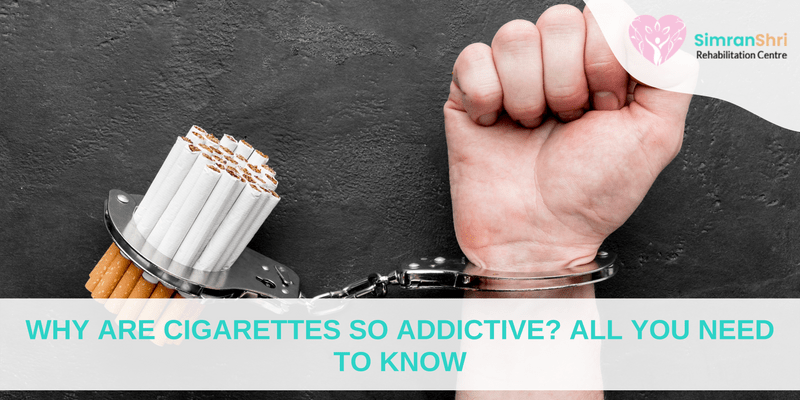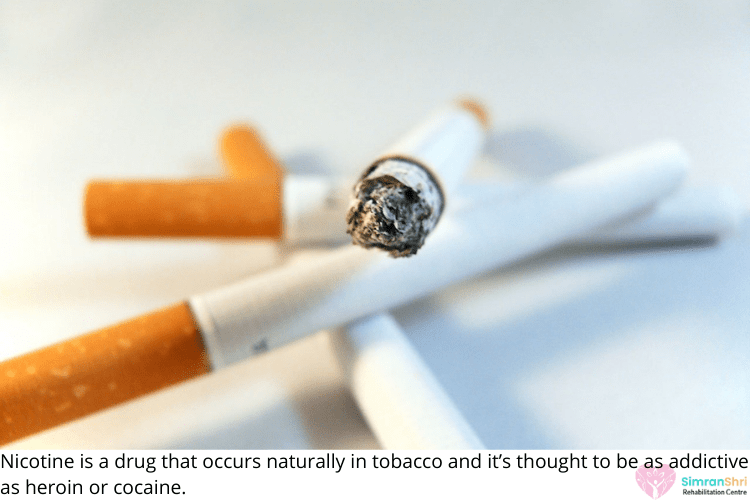

Addiction is the compulsive need to use substances despite their negative consequences. It is the physical and emotional dependence on a substance. Nicotine is an addictive substance present in tobacco. Regularly using tobacco results in addiction. Nicotine, a naturally occurring drug in tobacco, is as addictive as cocaine or heroin. It is easily absorbed in the blood through the lungs and spreads throughout the body. Nicotine consumption results in a pleasant feeling that relieves stress; it makes individuals want more. It floods the brain's reward system with dopamine and gives a rush of pleasure to the user. With regular use, individuals start experiencing unpleasant feelings as soon as the effect of nicotine starts wearing off.
Cigarette de-addiction treatment can help individuals break this physical and emotional dependence through medications and psychotherapy. Scroll down to learn more about tobacco addiction treatment and take the first step to recovery.

Nicotine dependence can develop with the use of any amount of tobacco; here are some signs and symptoms of tobacco addiction:
● One cannot quit smoking. Making multiple attempts to quit yet failing each time
● Experiencing withdrawal symptoms on stopping. Refraining from tobacco intake causes physical and psychological symptoms such as irritability, anxiety, difficulty concentrating, restlessness, frustration, depressive mood, increased hunger, anger, constipation, insomnia or diarrhoea.
● One continues smoking despite health problems. Struggling with lungs or heart issues did not stop one from smoking or consuming tobacco.
● Avoiding social activities. One avoids going to places where smoking would not be possible or doesn’t socialise with people one can’t smoke with.
If you or your loved ones are going through these symptoms, consider seeking a tobacco addiction treatment.
Electronic cigarettes are not proven to assist in quitting cigarettes, nor are they more effective than nicotine replacement therapy. On the contrary, individuals who switch to e-cigarettes to quit cigarettes often find themselves smoking both cigarettes.
It is not a good idea to replace one tobacco product with another; tobacco products by any means are not safe. One must stay away from the following products:
● Smokeless tobacco
● Cigars and pipes
● Dissolvable tobacco products
● Nicotine blams and lollipops
● Hookah
Individuals rarely quit smoking by themselves; a smoking addiction treatment is generally required, combining medications and psychotherapy to treat the individual effectively.
Nicotine replacement therapy is popularly used to quit smoking products. These contain varying amounts of nicotine, and thus, some require a prescription, and others don't. Other approved medicines too that do not contain nicotine but are only available through prescription.
These medications reduce the nicotine cravings and ease the withdrawal symptoms, increasing the probability of one quitting nicotine.
Although one can buy some medications without a prescription, it is ideal to consult the Best Tobacco Addiction Treatment centre. You can discuss with a mental health professional to get the right information about the medication and its dosage best for you. One can even learn about the possible side effects.
While the best detox treatment centre can offer medications to reduce the cravings and help with the withdrawal symptoms, an individual could still relapse. Counselling is required to help individuals develop the coping skills required to quit tobacco. The more dedicated you take the counselling sessions, the more likely you will recover.
Individual and group counselling helps one learn the techniques to stop smoking. Cigarette de-addiction programs are provided by various hospitals, health care setups and employers. One can even opt for inpatient treatment to get the most intensive treatment.